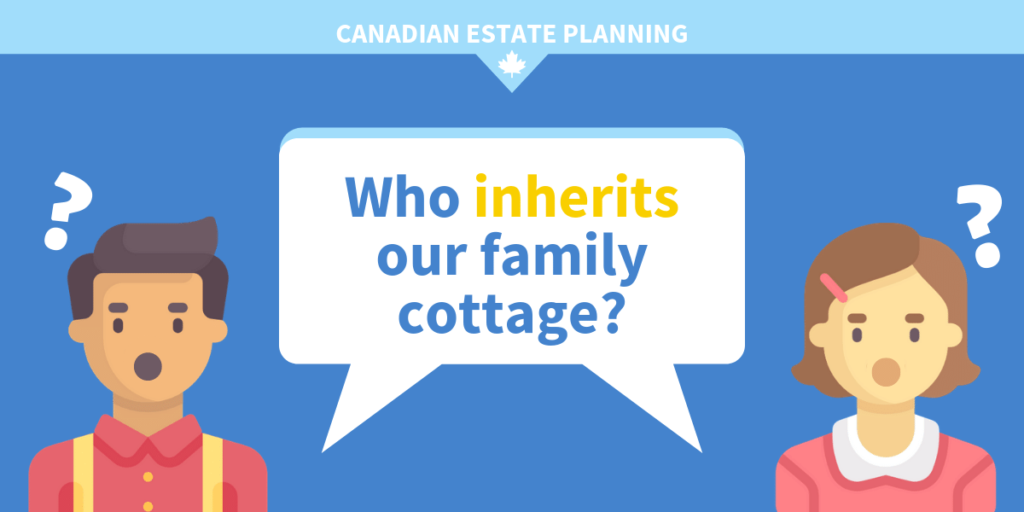Relaxing lake-side at the cottage is a classic Canadian past-time, but at the end of the day it leaves many families with the same cottage co-ownership challenge: who’s going to inherit it?
Unfortunately, the sentimental value intertwined with many cottages makes them a common target for estate disputes and conflicts.
So how can Canadians prepare their estate to make sure fond cottage memories don’t fuel a heated legal battle?

“What we are really challenging is the family identity when we say this actual memory or this thing that we all share is going to now belong to one person. Would you give your family history to anyone? Of course not.”
Barbara Benoliel, Cottage Succession Mediator, CBC Radio
The looming fear of “what happens when” is a reality for many people with co-owned properties, especially with an increasingly aging Canadian population, but there is a solution.
Cottage co-ownership agreements can help you to avoid disagreements over costs like renovations and property taxes and decisions like summer schedules.
Continue reading to discover how to avoid co-ownership predicaments your family may encounter and the unspoken advantages of entering a co-ownership agreement.
Common Cottage Co-Ownership Disputes & Solutions
1. Property Maintenance
The main concerns co-owners typically face are related to taxes and personal issues, however, simple property maintenance is an unexpected cause of friction that many do not anticipate.
- Often the financial responsibilities associated with things like upgrades and repairs can strain relationships and put the property into a state of chaos.
- For example, one owner may be interested in investing more into the property renovations while another may have more time to invest in performing repairs.
- This may end with one family member feeling as though they deserve more ownership of the cottage than the other.
These five steps are the ideal method to avoid cottage co-ownership disputes over property maintenance:
- Consult with your co-owner before performing any maintenance.Do not discuss it after it has already been complete.
- Set a feasible annual budget for cottage maintenance and include a reasonable amount for emergency repairs.
- Schedule a realistic time-frame for getting projects complete; stagger your upgrades on a priority basis.
- Set aside specific times for everyone to complete large projects together (i.e. opening and closing weekend for seasonal cottages, building a deck or shed, etc.) and assign specific tasks equally to co-owners to avoid miscommunications.
- Establish a schedule for recurring responsibilities (i.e. replenishing essentials such as cleaning supplies and toiletries, taking out garbage and recycling, lawn maintenance.)
2. Fair Use During Peak Seasons
The cottage season for Canadians is definitely short-lived, many cottages are even seasonal and can only be used from May – October. This makes weekends and holidays highly sought-after and an obvious source of conflict.
Clashes within the family may spark as visits with friends or long periods of stay start building up, especially if your cottage isn’t large enough to accommodate everyone comfortably.
It is very highly recommended that co-owners implement a schedule for family vacations at the start of each year and be sure to consider the following:
- Equally distribute long weekend holidays.
- Rotate the schedule each year so that no one gets the same weekends every year.
- Rotate who selects first each year.
- Post the schedule at the cottage or share it online so it is accessible to all family members using it (i.e. children of co-owners).
- Notify your co-owners of any guests coming to the cottage with you.
- Provide your co-owners with sufficient notice if requesting a switch (i.e. 3 weeks).
- Agree on a set list of duties to be completed after each use (i.e. turning off water and heater, cleaning floors, changing sheets, etc.).
- Outline specific cottage use rules for all co-owners (i.e. does a co-owner have to be present or could a child of a co-owner use the property? Are pets allowed? Is smoking allowed? Are there noise restrictions or fire regulations?)
Free Cottage Co-ownership Checklist
Need a hand covering all of the details in your yearly cottage plan?
Save and print this free Cottage Co-Ownership Checklist to use at your annual planning meeting. It will help avoid any miscommunications among co-owners and ensure fair use of the family cottage.
You can find more free resources for estate planning right here.
The Flip Side: Advantages of Cottage Co-Ownership
It should be clear by now that cottage co-ownership can create a messy situation for families, and not just when it comes time to sell.
Even though co-ownership may seem like a dangerous idea at times, there are actually quite a few advantages of co-ownership when done in a properly planned way.
You should consider exploring a co-ownership agreement if you agree with any of the following statements:
- You’d like your family cottage to stay within your family for sentimental reasons.
- You’d like your cottage to remain in-tact and not be purchased by someone interested in the property, not the structure.
- You are apprehensive about being able to handle the cost of purchasing the property as a sole owner.
- You are apprehensive about being able to handle the maintenance and upkeep expenses that occur monthly and annually.
- You are concerned about your physical ability to manage the property.
- You are concerned about the amount of time you will be able to spend at the cottage vs the investment.
Continue Learning
4 Ways to Pass On the Family Cottage
Who should I choose as my Executor?
My child is my executor – how can I prepare my estate safely for them?
Digital estate planning: How to handle Cryptocurrency, social media…

